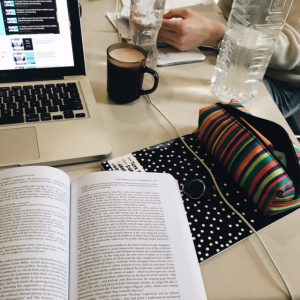Well, everybody, I’ve survived Law and Classics relatively unscathed, and I’m back to give you the rundown of my remaining courses this semester: Classics 110 (Classical Mythology Through Tragedy), European 100 (Europe and the World), and Art History 109 (Shock of the Modern: Monet to Warhol). As usual, keep your hands in feet inside the vehicle at all times, and here’s hoping a few of you grab some helpful information from this post!

Revision for the European 100 exam surrounded by friends in various states of focus. (Spot the Tony Award-winning soundtrack – giving me a break from Melodrama, which has actually reawakened my soul.) I’d like to thank Sammie, my RA, for supplying me with earphones so I wasn’t blasting tunes in the silent study space!
Classics 110 (also available as a General Education course): I have thoroughly enjoyed Classical Mythology Through Tragedy! Having been a Greek theatre buff in high school – I played a Hillary Clinton-inspired Creon in an all-female Antigone – I thought this paper sounded like the perfect balance between strengths and interests. Basically, the paper covers five Greek tragedies, which you read and analyse and essentially pick apart with a fine-tooth comb over the course of the semester. The only assessments are one 30% coursework essay and the 70% exam, and both are manageable if you keep up with your readings, annotate your play scripts according to the lecturer (who is probably one of my favourite people and an absolute goddess herself – informative, knowledgeable, and whip smart with her wit. An icon to behold who I’ll definitely look for in the future), and don’t leave writing/revision to the last minute. Being prepared is cool, kids! Go to the tutorials – you’ll miss out on so much if you don’t (and make sure you do the prep sheets they put up on Canvas beforehand so you know what to expect!) – and above all, go to your lectures! Because not only are they enjoyable – in an air-conditioned lecture theatre that will almost put you to sleep as you listen to the incredibly interesting musings of the lecturer, whose voice is really way too calming – but they are also not recorded!! Do not, for the love of all that is good, miss one of these lectures if you don’t expressly have to. And try to make at least one friend in the class whose notes you can grab in the event that you do have to miss a lesson! Because once that knowledge has been spoken, it’s gone forever, and every note counts with Greek tragedy.

Snuck away earlier in the week to visit my Great Grandma on the coast. She had this gorgeous bouquet on her bedside table!
European 100 (also available as a General Education course): Europe and the World packs at least four papers’ worth of information into one, and I’ll let you know that before anything else. Lots of people take this class as a Gen Ed, or as a requirement for a language major, but I’m one of those people who’s picked European Studies as a major in itself (the only one I’ve met, to be honest). There are various assessments, ranging from little quizzes on Canvas to a coursework essay to a written test to the final exam, but these are once again not anything to fear if you’re keeping up with the content. And there’s a lot of it with Euro 100. Readings can be long but they are necessary for quizzes and to fill out your understanding of the material. Because of the plethora of topics within the paper – from ancient times to contemporary Europe – there are loads of guest lecturers throughout the course, which means you never run the risk of getting tired of the same teacher and there’s someone new to look forward to every week!

The detour to the coast also meant visiting the digs my grandies have had since I was at least four feet shorter – which is great, because I know every nook and cranny of the place, but also strange, because they’re getting ready to sell it, and soon somebody else will be building memories in a house that holds so many of mine. #DEEP
Art History 109: if your interest in the history of art is potentially fleeting, or “I don’t know, I’d watch a History Channel doco on any of these dudes; they seem pretty sweet”, then this is probably not the course for you. The content covered is Herculean. The lecture slides are teeming with pieces of art, but little to no words. I filled an entire notebook with tiny handwriting and manic scrawls. Shock of the Modern is an undertaking, my friends, and I want to make sure you know that. It’s also very interesting, and I don’t have a heart full of regret for having taken it, but I would’ve wanted to know beforehand just what a juggernaut the course content could turn into. With that said, there are only two assessments (an essay and a visual test) prior to the exam, so it’s not like the course load’s massive – but the content. Wow. Loads of the students who take this are Fine Arts majors of some description, so it’s a cool group to get to know, but – yeah – keep an eye on what other classes you’re taking so this one doesn’t turn into a dark cloud with readings looming like shadows from impasto paint.
Alright, team! That’s the roundup of my courses from the first semester! Feel free to leave any other questions below – and if you’ve got questions about other BA courses, don’t hesitate to comment with them as well because I have probably heard a few things through the grape vine! Next time you hear from me, I’ll have officially finished my first semester… whoa! Guess I’ll catch ya on the flip side.
(In the meantime, Rietbergen’s Europe is calling me.)

Can you do a room tour/vlog of hall?
Watch this space! X